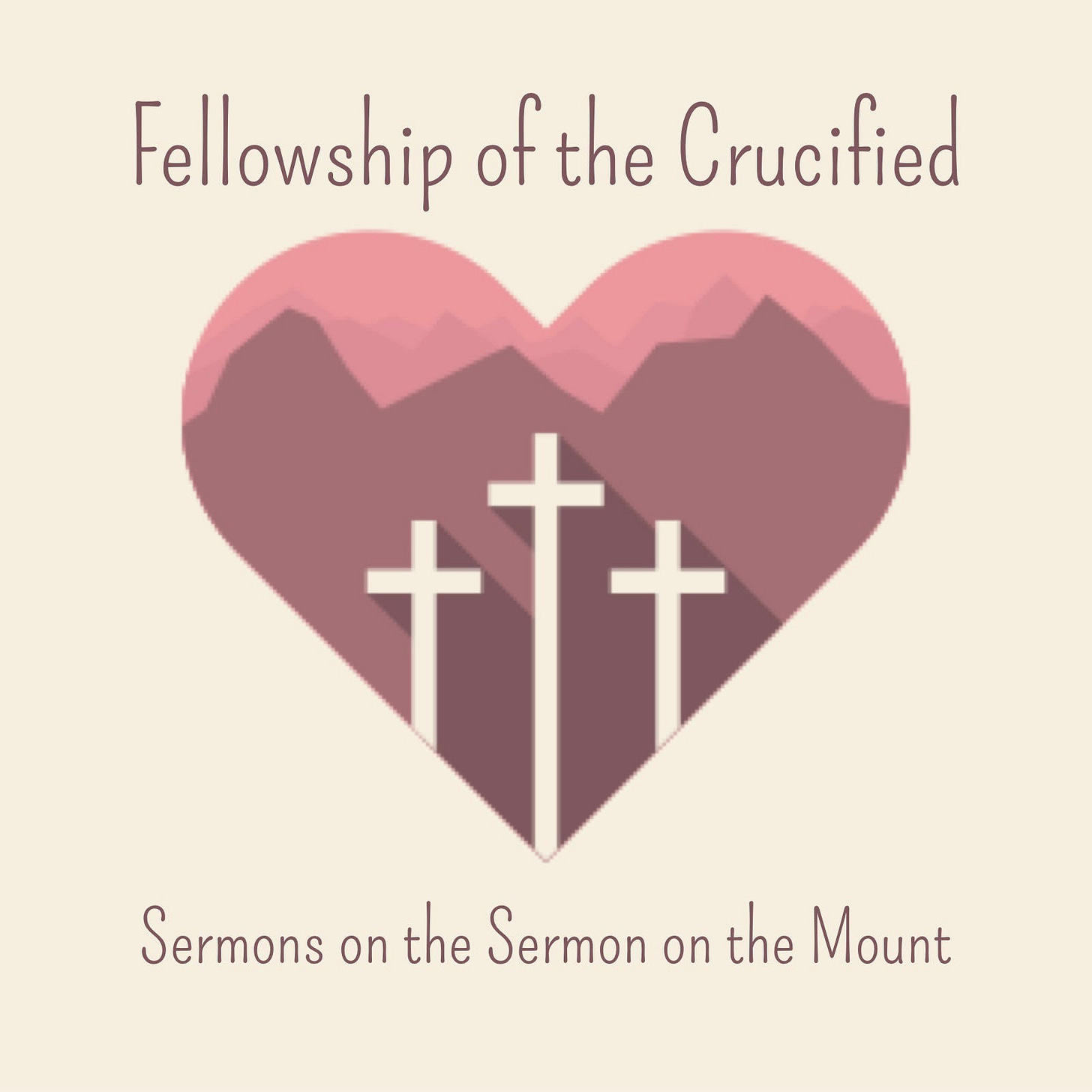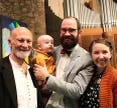Matthew 6.16-34
Dear Elijah,
By now, with your new first grader haircut, you’re old enough to know why I’m writing you a letter instead of FaceTiming you. Six years ago this time in Kingdomtide, you were baptized. I wonder, have you gotten used to the fact of your baptism yet? I hope not, for it is a wonder indeed.
Elijah, you and I both live in America, the part of the world that the theologian Karl Barth once derided as “the place where they believe in the freedom of the will.” Nevertheless, neither you nor I had much say in the deed God did all those days ago— by my count, over two thousand days ago. Six years ago, you were baptized. And I was made your godfather.
Notice, padwan, in those sentences we are both the subjects of passive verbs. We were not the active agents. Your Mother and Father made me your godfather (I couldn’t really say no) and, God baptized you.
God baptized you, Elijah.
And, maybe you’ve learned by now, God does not take “No” for an answer. God turns our every “No” into an empty grave. So six years ago today, without the alleged free will of either of us being duly respected or consulted, you were baptized.
To paraphrase the ancient liturgy with which the deed was done:
With water and the Spirit you were made an unevictable squatter in the body of Christ.
Unevictable!
If this was baptism’s only gift, you’d be sitting pretty with a straight flush and a free cocktail on the way.
But wait, there are still more gifts:
With Spirit and water, little man, you were also clothed with an irremovable suit of forgiveness.
Irremovable!
All your sins wreaked between October 23, 2016 and the date of your (second) death, whenever that day might come, are forever free. No matter the parts of you you’ll one day come to worry are eternally unmentionable, Elijah, by the deadness of Christ’s human mind, your absolution is absolute. This is a gift that’s as offensive as it is awesome. And be warned, the species of people most prone to baptism’s offense are called church people.
Finally:
At the font you were incorporated into “the mighty acts of God.”
As a baptized Christian, you are not only a witness to the mighty acts of God.
On this Sunday six years ago, you became a moment in them.
You were made a moment in the mighty acts of God.
One day you’ll discover, Elijah, that some people think the problem with miracles is whether they are possible. Such people are not Christians; or rather, they’re not very smart Christians.
The true problem is not whether miracles are possible but how we can distinguish them from events in general.
Baptism is one of the ways we mark such a distinction. Because, of course, God is not some First Cause that got it all going back in the very beginning of everything. God holds all that is in existence at every moment of its existence. Once you understand that, you realize it’s all miracle. This Halloween you will dress up as Luke Skywalker from Episode VI so let me put it this way. God is not the cold, distant, impersonal Force that was the best George Lucas’s imagination could conjure.
God is more like a magician with an impossible number of hands who keeps an infinite number of plates spinning and spinning and spinning without ceasing.
You might question or quibble with how he’s doing with one or two of the plates, but, gosh, Elijah, just step back and look at the marvel of the whole magic trick. He should get a standing ovation.
That is, the world is not a machine.
Language matters when it comes to matters that matter. And when it comes to the world, it makes all the difference that Christians do not call the world nature. We call it creation.
The world is not a machine.
The world is a moment to moment miracle.
At the very center of his Sermon on the Mount, Elijah, in rapid succession, Jesus dishes on prayer and fasting, the dangerous lure of money and the failure of faith that fear and anxiety name. These subjects are not unrelated. Our accrual of wealth and our worries about tomorrow, Jesus says, are ways we attempt to live in the world as something other than creatures. Petitionary prayer and abstention from food, meanwhile, are disciplines through which we are made to remember that we are creatures not altogether different from the birds of the air or the lilies of field. We’re all the present-tense products of the mighty acts of a Maker who makes not simply the basic necessities of our lives but the beautiful things in our lives as well.
Prayer and fasting, petition and charity, facing tomorrow with a trusting, open hand rather than a clenched and frightened fist, these are all ways, Elijah, that Jesus gives us to protest against the purely material, mechanistic view of the universe. This is an important protest because a good many people, a good many Christian people, worship like theists but they act in the world like functional atheists. They might believe God exists but that they don’t live as though God has died to be in a vital relationship with them. “I think prayer changes us not God,” such people will sometimes say. As Jesus makes very clear in his Sermon on the Mount, the God so named is not the God of the Bible. What is around us, Elijah, is not iron, impersonal fate but an omnipotent conversation between Father, Son, and Holy Spirit that baptism has opened up to you. Because you are in the Son, through the Spirit, the Father listens to you. Why should we ever think the Father is less interested in each of us than you are in your new sister?
You were created by a word from beyond you, little man.
To be is to be spoken of by God.
To be the creature you were meant to be, therefore, is to hearken after what is beyond you. Which is to say that while you are a creature like a flower or a sparrow, you are also different from all the other creatures.
You are more than a talking animal. You are a creature addressed by God. You are a creature enabled and ennobled to respond. You are an animal who can pray. Prayer puts you back in paradise, in a rightly ordered relationship between creature and Creator. However, one other distinguishing characteristic of human creatures is that we are the only creatures who know not how to be the creatures we were created to be.
By virtue of your baptism, Elijah, you belong to those whom Christ speaks today with this so-called comfortable command: “Be not anxious.” But to understand that you are addressed by this law is not to know how to accomplish it. How are you supposed to live as a lily blooms? “Be not anxious” is a simple enough command, even a child can understand it. Yet even a child will know it’s easier understood than brought off. Just ask your parents, Elijah, or your Aunt LP and Uncle Mike who all anxiously awaited the arrivals this year of your new sister, Phoebe, and your new cousin, Finley. They were not foolish for their fretting. The journey from my head to my heart is the longest road in the universe; I can no more control my fears and anxieties than I can keep myself from falling in love.
Speaking of new births, Elijah:
That we refer to baptism as a second birth, suggests that you being human has less to do with you having emerged from your mother’s womb and more to do with Jesus being born of Mary.
We don’t naturally know how to be human.
Only Jesus, who is also fully divine, is fully human.
No other human being in history has been fully human.
Only Jesus knew how to be the creature we are created to be.
Only Jesus is fully human.
And notice, Elijah— surely you know some of the stories by now: from time to time, even Jesus blinked at the day ahead of him. Before the tomb of Lazarus, his friend, Jesus does not keep calm and carry on. He weeps and grows “greatly disturbed.” On the cross he sounds far worse than anxious and afraid for the future. He sounds like he’s convinced there is no future, “My God, my God, why have you forsaken me?!” The Jesus who commands us to “be not anxious” is the same Jesus who, later in Matthew’s Gospel suffers anxiety. In Gethsemane, Matthew reports, Jesus confides to his disciples that he is “depressed and confused.” “Remain here with me and stay awake, for I am so depressed I could die,” Jesus says. And then, according to Matthew, Jesus can manage only a few more steps before he throws himself down on the ground, and the Greek word Matthew uses— it means to shudder in horror, stricken and helpless.
“Be not anxious,” Jesus commands us on the mountaintop.
But then in the garden, he is scared out of his mind.
And from the garden he’s taken in handcuffs to the palace of Caiphas, the high priest, where he was tied and bound and lowered down through a shaft some thirty feet into a jail cell cut out of solid rock in the palace dungeon. I visited that dark place a few months ago, Elijah. I can tell you you, once Jesus was down there, inside the pit, it would be only human to fear there was no way out, no one, no hope. Certainly, Jesus suffered there something more than anxiety.
What conclusion may we draw from this apparent disconnect, Elijah?
Does Jesus, in his human nature, fall short of the very command he issues in his divine nature?
If that’s the case, then Jesus— noble, enlightening fellow he may be— is something less than a vicarious savior. In which case, you reading this letter, Elijah, and everyone who hears it doubling as a sermon are, in Paul’s words, the most pathetic people in the world. If Jesus is but a teacher who cannot live up to his teaching, then you and I and damn near everyone— no, everyone— remain dead in our trespasses and sins. And we should get comfortable there; we’re not going anywhere.
Remember, Jesus alone is the true human. And what does Jesus do when dread and anxiety beset him before the tomb of his dead friend? Jesus not only weeps. Jesus prays. “Father, I thank you for hearing me,” he prays.
And when depression overwhelms him in the garden, while the disciples sleep off their wine, Jesus prays, “Father, if it be your will, please let this cup of suffering pass from me.” The same Jesus who cries out in fear on Calvary nonetheless follows that shriek of forsakenness with the prayer, “Father, into your hands…” Though the Gospels do not record it, I’m willing to bet your Dad’s Lego collection that, all alone in the bowels of Caiphas’s dungeon with the cock crowing thrice just outside the prison walls, Jesus prayed.
I’ll even wager that Jesus prayed Psalm 88:
“O Lord God of my salvation, I have cried day and night
before thee: Let my prayer come before thee: incline thine
ear unto my cry; For my soul is full of troubles: and my life
draweth nigh unto the grave. I am counted with them that go
down into the pit.”
Another crazy good gift of your baptism, Elijah, is that, through water and the Spirit, you’ve been reckoned Christ’s own permanent perfect record, gratis. That Jesus fulfills all the Law for you means Jesus also fulfills this particular law that he himself lays down, “Be not anxious.”
If the one who cries out “My God, my God, why have you forsaken me?!” nevertheless fulfills the command “Be not anxious” then the command does not mean that you must avoid fear and anxiety. (How could you possibly avoid feelings and emotions you cannot control?)
Rather, the command instead means that you dare not attempt to navigate your fears and anxieties alone, as if there is no a Mighty Actor in the world who graciously stands ready to hearken to you.
To be not anxious, therefore, is not to go through life unafraid or nonplussed.
It’s to trust that no matter what Sin, Death, and the Devil throw at you, God’s office can always be found at the end of your rope.
To be not anxious, little man, is simply to be, like Jesus, always ready to pray the most important prayer, “Help.”
Of course, if all my teaching to you, Elijah, could be summed up by saying something as Kindergarten as “Be like Jesus,” then I would be the cruelest of godfathers. Because as wonderful as Ali and I find you, the truth is you can’t be like Jesus.
Underline this: You can’t be like Jesus; that’s why we have Jesus.
You can’t be like Jesus, at least not for very long and, honestly, no other person should have to suffer your attempts to be a full-time Jesus doppelgänger. What’s more, advice like “Be like Jesus” contradicts the very nature of the sacraments. What sets baptism and eucharist apart from all the other mighty acts of God is that they are tangible, visible signs that come with promises attached to them.
Take note, little man, a promise presumes a plot.
Promises can only be made in a relationship that is going somewhere (“From this day forward…”). Promises are unintelligible if life, reality, existence is not a plotted story.
You see, Elijah, the world is not a machine; it’s a Story.
You inhabit a Story, a Story much bigger than your own story. Even better, the story of your life is not your story to bring off to applause. There is a Storyteller. This is good news and great comfort because, despite my good advice, there will be many times when you are anxious and afraid. And there will be almost as any times when you do not cry out to God for help but instead attempt to carry the world on your shoulders.
Take it from me, kid. I know in ways that still make me blush. It is in these precise failures that you will wonder if maybe you don’t deserve to be cut from the cast of the Storyteller’s Story. Maybe you’re just summer stock material. These moments of failure and folly, you can’t set your watch by them, but you can certainly hop over to the casino across the river and bet on them. They are a sure thing.
It’s in such moments, Elijah, that you can remember your baptism and be thankful. For when questions about your place in the Story and your performance of the Story become serious, your only assurance is that you belong to God’s permanent cast, and your only assurance of that is the fact that God made you so through water and the Spirit.
Because God baptized you, made you one of his distinguishable miracles, you are now a necessary and irrevocable plot device.
You cannot now, or ever, go back from the church into the world; you can only leave the church for the world to come.
You cannot now even say no to your part in the Story, for you have been baptized you into the Son.
And, in the Son, the Father has already always chosen your rejection of him as his means of redeeming you.
Elijah, a worshipper once accused me on their way out of church, “You speak of the sacraments as though they’re magic!”
“Yes,” I said, “It’s just important to remember that they’re God’s magic.”
Elijah, you are a rabbit that God pulled out of a hat six years ago today.
Remember, nothing you do or leave undone can reverse God’s magic trick.
Love,
Jason

















Share this post